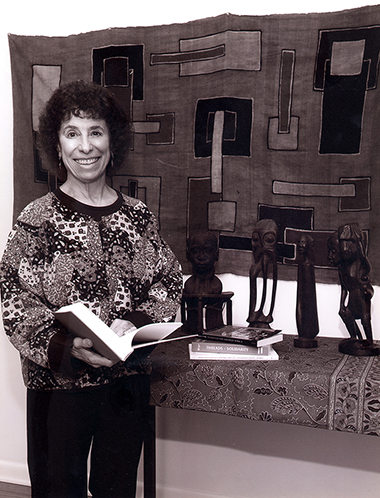Prestigious and Transformational Scholar
 |
|
Iris Berger's Collins Fellow photo, with a Malian cloth in the background, East African carvings on the table and three of her published books in her hands and beside her. (Photo by Joan Heffler Photography.) |
ALBANY, N.Y. (November 2, 2017) — As a young collegian in the Kennedy years, Iris Berger was intellectually stirred by new strong winds of international engagement and the struggles for civil rights in America and independence in Africa. Her path to a singular place of scholarship and leadership in African studies had begun.
In July, Berger, Professor Emerita of History, was named the winner of the African Studies Association’s (ASA) Distinguished Africanist Award, given each year since 1984 to recognize a scholar who has a long record of important contributions to their respective field of African studies and service to the Africanist community. She is the sixth woman to receive the award, which will be presented to her at the annual meeting of the ASA in Chicago on Nov. 18.
Berger, who retired from full-time teaching at the University in 2012, is the author of numerous influential monographs, edited volumes, co-authored books and more than 30 articles published in top-tier journals and edited collections. Her first monograph, the award-winning Religion and Resistance: East African Kingdoms in the Pre-Colonial Period, was published in 1981, the year she came to UAlbany as a visiting assistant professor and director of the Women’s Studies Program.
Three years later, she joined the full-time faculty of History, with joint appointments in Africana Studies and Women’s Studies. A particular emphasis of her work became the critical roles and historical agency of women in Africa. She championed women’s and gender studies as essential facets of scholarly research in Africa (and elsewhere). This placed her at the forefront of pioneering feminist scholarship, culminating a year ago with the release of her book Women in Twentieth-Century Africa (Cambridge, 2016).
Berger was awarded the University’s highest honor, the Collins Fellow, in 2010 and the Chancellor’s Award for Excellence in Research and Creative Activities in 2012.
Adventurous Young Scholar
In the early ‘60s, she was an adventurous history major at the University of Michigan, covering the civil rights movement and international affairs for the campus’s Michigan Daily, and, in 1962, studying in Paris during the tumultuous end of the anti-colonial war in Algeria. Upon graduation in 1963 and through 1965, she taught in Kenya, first at an elementary school in Meru, then at a girls’ high school in Machakos, where she was responsible for classes in history and English.
Eloise Brière, a UAlbany colleague of Berger’s from 1982 – 2013 and a specialist of African literatures in French, said that, before Berger’s years in Albany, “Iris was in Africa, on the trail of what would become her life’s work. Scarcely older than the young women she taught at Machakos Girls High School, she was intrigued by the questions they had about the role of women in their world.
“The young history teacher could find no answers in the histories of Africa written by and for the European men who conquered the continent, no African past to reflect upon, much less a trace of women’s contributions. Iris rolled up her sleeves and began the herculean task of restoring African women to history.”
Mentor and Inspiration
Berger emphasizes that many other scholars joined together in this effort, part of the burgeoning field of women’s history that emerged from the feminist movements of the late 1960s and early 1970s
Susan Gauss, a history department colleague at UAlbany from 2003 to 2016 and now a faculty member and chair of the Latin American and Iberian studies department at University of Massachusetts Boston, said “Iris is not only a preeminent scholar of African studies and women’s history, she has also been a mentor and inspiration to countless other scholars, faculty members and students for over four decades.
“Her pathbreaking scholarship and leadership at UAlbany and in professional organizations around the world have fundamentally transformed the opportunities available for future generations both at UAlbany and beyond.”
Berger’s honors are many, including her election as president of the African Studies Association, in 1995-96, vice-president for research of the American Historical Association, and many journal editorships. She also served as the ASA representative at the American Council of Learned Societies and as a board member of the Social Science Research Council.
“I'm honored and delighted to receive an award that has gone in the past to an impressive group of international scholars from many African and European countries, as well as the U.S. and Canada,” said Berger.
“What I have valued most in African studies is a career working with a committed group of U.S. African and other international colleagues and students and the opportunity to contribute to the challenging field of precolonial history. In addition, researching women’s political and social movements has enabled me to relate my scholarly interests to contemporary campaigns for social justice.”
![]() For more news, subscribe to UAlbany's RSS headline feeds
For more news, subscribe to UAlbany's RSS headline feeds
A comprehensive public research university, the University at Albany-SUNY offers more than 120 undergraduate majors and minors and 125 master's, doctoral and graduate certificate programs. UAlbany is a leader among all New York State colleges and universities in such diverse fields as atmospheric and environmental sciences, business, education, public health,health sciences, criminal justice, emergency preparedness, engineering and applied sciences, informatics, public administration, social welfare and sociology, taught by an extensive roster of faculty experts. It also offers expanded academic and research opportunities for students through an affiliation with Albany Law School. With a curriculum enhanced by 600 study-abroad opportunities, UAlbany launches great careers.


